I can truly say from the bottom of my heart that giving birth in Brazil was one of the most beautiful and cherished, and obviously life changing experiences of my life.
I am now 3 months postpartum and I’ve been getting nonstop questions about the whole process. I know that for some people, it can seem terrifying!
So my is to answer all the frequently asked questions about logistics, from visas and hospitals to costs. Plus my exact birth team!
Ultimately, I would like to pave the way so that if you want do something that’s out of the ordinary, that’s outside the box, or even do this yourself, you will know exactly how to do so!
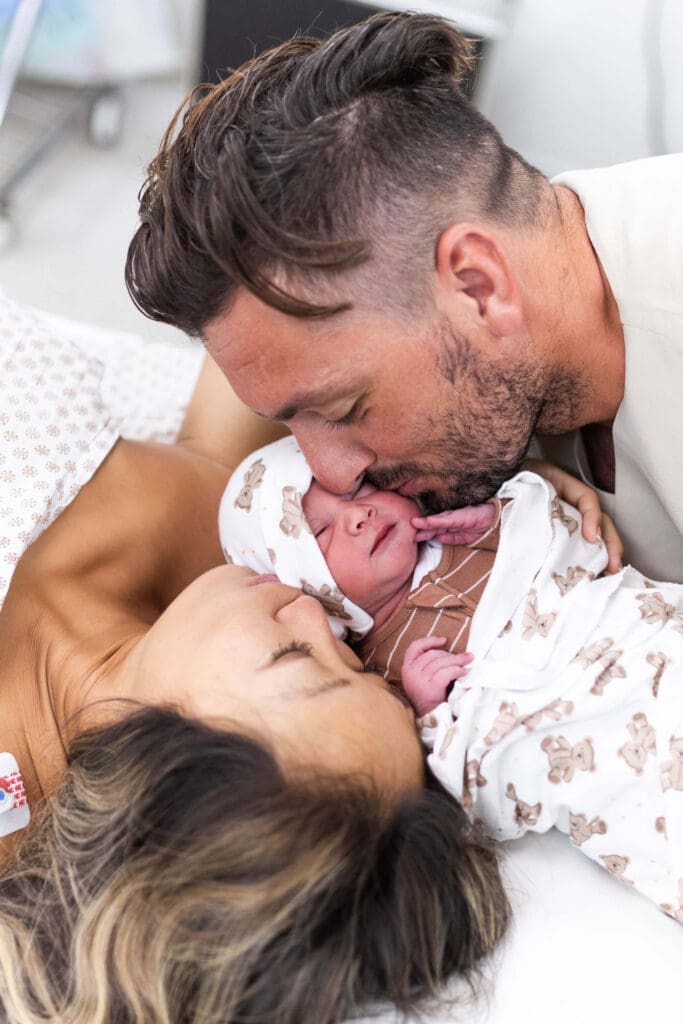
Why give birth in Brazil?

Citizenship
One of the biggest reasons we chose Brazil is because of jus soli – also known as the right of soil. This means that any baby born on Brazilian land is automatically granted Brazilian citizenship.
Because I am American and my husband Ragz is British, that means our son Leven is born with three citizenships and three passports.
The parents also get permanent residency, and the option to become citizens after a year.
We saw so much value in opening up doors for future investments and for future living opportunities as an international family.
Ragz and I spent almost a year in Brazil during the pandemic and LOVED it, so this decision was a no-brainer for us.
Healthcare
Beyond citizenship, Brazil also offers incredible healthcare; world-class doctors, so much research and development into medicine, a super open, beautiful, supportive culture around children, childbirth and pregnancy.
Natural Environment
Depending on where you go, you have access to amazing nature, including beaches and jungle and mountains. It’s just such a massive, beautiful country, with so much to choose from.
As surfers and beach lovers, we knew it would be best for our physical and mental health to spend my third trimester and first months postpartum by the ocean.
I felt so cared for, respected, and so empowered throughout my entire journey. That chapter of my life just holds such a special place in my heart.
Which city should you choose to give birth in?
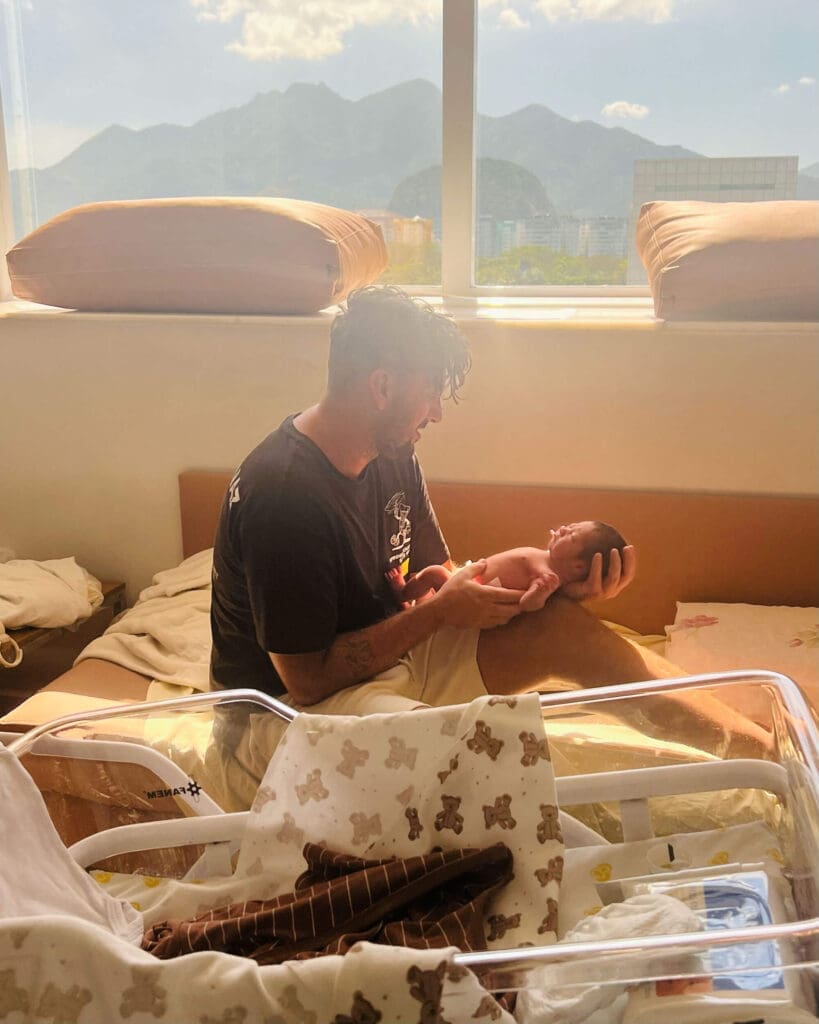
Depending on what you prefer, there are so many different cities that you can give birth in. Brazil is such a big country, so depending on where you end up will impact your experience.
The most popular cities for foreigners, I would say are Sao Paulo, Brasilia (the capital), Florianopolis and Rio de Janeiro.
We chose Rio, but depending on what type of birth you want, what type of environment you envision yourself being in pre and postpartum, will help you decide where to go.
Do I need a visa to give birth in Brazil?

The short answer is no. You don’t need any specific visa to give birth in Brazil. You can enter on a tourist visa like I did and legally give birth.
Brazil does not prohibit foreigners from giving birth in the country. And in fact, many people choose this option intentionally for the benefits.
You can also be on a temporary visa like a digital nomad visa, student visa or residency permit.
The key is obviously ensuring that your stay is legal and that your documents are in order when the baby is born because you don’t want anything messing up, getting your baby’s birth certificate or registering the birth in your home country.
What type of birth do you want?

Brazil is super flexible when it comes to birth options.
You can choose a home birth with midwives, which is legal and supported in major cities as long as you are within 20 minutes from a hospital.
You can choose a natural vaginal birth in a hospital setting or an elective C-section, which is very common in Brazil, and actually more common than vaginal births in many private hospitals.
In America and the UK, which were obviously my other two options of where to have my firstborn son, they don’t really allow you or it’s not as easy to get an elective C-section, which is what I wanted.
I knew from the beginning and I personally chose an elective C-section. You can hear all about that in my birth episode.
Because of this, I wanted to be in a city with amazing private hospitals, access to English speaking professionals, and I wanted to be near a beach where I could surf and just relax and be in warm weather.
Florianópolis, on the other hand, is known for home births and there is a huge movement for them.
What are the differences between public and private healthcare in Brazil?
Another major plus about Brazil as a whole is that they have free public health, including for tourists. The system is known as SUS, and so if you get hurt in Brazil or if you need to go see a doctor, you can go to the public hospital and get everything done for free.
In England, they have the NHS, but for tourists you have to pay out of pocket.
There is a big difference between public and private healthcare in Brazil.
I do know a lot of people who choose the public health system. There is nothing wrong with giving birth in a public health system, but I think morally I just feel wrong if I enter as a tourist and use the resources of citizens and taxpayers.
Also with the public hospitals, not a lot of doctors speak English. They can be crowded and depending on which region you go to, they can be underfunded, so they might not be the best option.
If you’re looking for more personalized care, private hospitals and care on the other hand, are super high quality, efficient, and very, very comfortable.
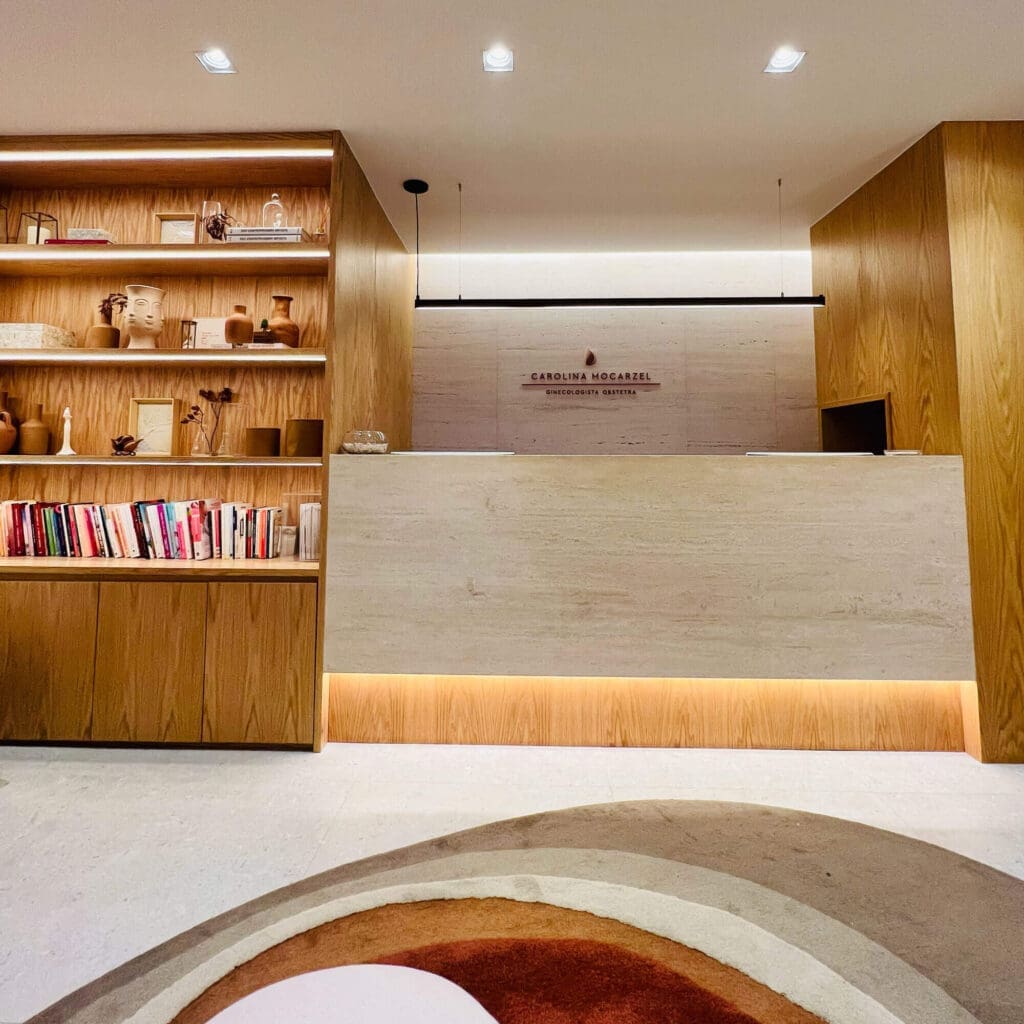
Many hospitals have hotel-like rooms, 24/7 service, top tier doctors, and there are some hospitals that we saw in Sao Paulo that even had viewing rooms where family and friends can look through this little looking glass and kind of throw a party in another room as they watch your birth, which is just so crazy, but also really beautiful in my opinion.
With private hospitals, you’ll pay out of pocket or through international insurance if you have. The experience is world class. I honestly cannot recommend it enough.
Do doctors in Brazil speak English?
Because I wanted a C-section, but also because this was my first child, I definitely wanted an English speaking doctor. And so in major cities like Rio and Sao Paulo, there are doctors and clinics that cater to expats.
While not everyone speaks English fluently, like nurses, you can easily find OBGYNs and pediatricians who do.
And again, if you go through the public health system, it may be harder to choose your doctor and especially find an English-speaking one.
I made sure to find a team where communication felt really easy. I felt like there were no language barriers, and of course, like in the operating room, I don’t want to have a translator if anything comes up. I don’t want there to be frantic conversations and me not being able to understand or having someone not be able to translate for me. So it made such a huge difference in helping me feel safe and heard.
If you are thinking about doing this yourself and you want to follow my steps, I’m also going to share the exact costs of how much I paid out of pocket.
How much does it cost to give birth in Brazil?
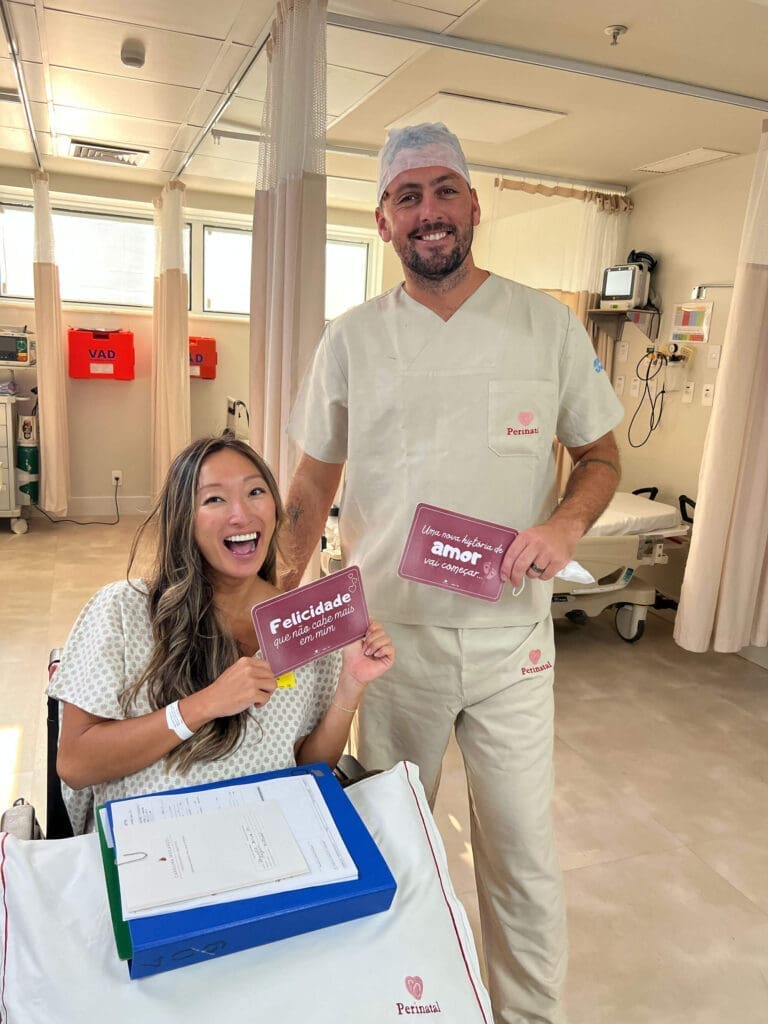
This will vary based on your doctor, hospital, and city you plan to give birth in. I will be sharing my experience, paying out of pocket, in Rio de Janeiro.
Prenatal Appointments
Appointments with a private OBGYN will range between $50-150 USD each. We had a prenatal appointment every four weeks to start in the third trimester, and then every two weeks closer to the delivery date.
Ultrasounds and lab work and blood tests range from $50 to $200 per session. This added up, I would say I had maybe three blood tests done.
Some imaging like cardiograph and all of those things, they ranged from $50 to $200.
Hospital and Doctor Costs
My personal private hospital Perinatal Barra that was $2,000 USD.
I then had a private doctor and her team: my main doctor that I saw throughout the whole process, and then she had another assistant.
Also on her team was an anesthesiologist, a physiotherapist, a pediatrician.
This came as a package. So when I first got a quote from my doctor’s office, they gave me a quote with everything included. Mine came out to just under $6,000 USD.
I would say this range is from $3,000 to $6,000. I got quotes from other doctors for $3,000 and some, I would say they charge you more if you’re a foreigner, but you can definitely find other doctors for less.
I would say I got the best doctor, and I loved her so much. I loved her whole team, and it was just under $6,000.
We paid everything out of pocket because I wasn’t covered by international maternity insurance, but I found the cost more than reasonable for the level of care I received, and I thought the whole experience was worth every single penny.
Total Budget
Overall, we budgeted $10,000 to give birth in Rio with the most amazing care and being on top of every single appointment and every single test.
Of course, if we opted for the free public health system, costs would have been near zero. And then obviously if you opt in for a home birth, let’s say in Florianopolis, your costs are significantly lower as well.
Photographer
We also opted to have a birth photographer who documented the whole process. Obviously this is optional!
I would highly recommend this as I have photos from the moment Leven was born, and amazing pictures of my family holding the baby for the first time.
Post-Birth
I personally chose to add on a doula, which ranges between $400 and $800 USD, as well as night nurses after delivery to help care for our new baby during the nighttime.
Night nurses range from $300 to $1,000 dollars per month depending on how many shifts you opt in for a week.
How To Give Birth In Brazil As A Foreigner

We arrived in Rio at 28 weeks pregnant, and I had never visited the city before. We instantly fell in love and it just immediately felt right.
The city has great hospitals, beautiful beaches, and an international community, and everyone was just so warm. Everyone wanted to help you. Everyone loved pregnant people.
You get priority everywhere you go. You get to skip lines, you get to park in parking spaces designated for pregnant people, and it was just amazing.
If you end up in Brazil at 28 weeks pregnant, I would recommend doing the following steps in this order.
Get A CPF Number
So the first is to get a CPF number. I have an entire blog post about this, but it is like a Brazilian tax ID and it will help you with registering for appointments and getting services. You literally need it for everything in Rio.
Find Your Hospital
Next step is to find your hospital, so research private hospitals in your city and book a tour if you want to give birth in a hospital setting. I went to, and I recommend Perinatal, but depending on where you stay, there might be a hospital closer to you as well.
Find An OBGYN
Ask for referrals and schedule prenatal visits. And also, look on Instagram – I found mine through Instagram! Everyone there has such a big social media presence, and it’s amazing because you get to see who they are, learn about their personality, their qualifications. It’s all online.
Create A Birth Team
Next, you want to build your team. Consider hiring a doula or a midwife if you want extra support, and just someone who understands English, who can guide you through the whole process and give you recommendations based on their clients.
Budget Accordingly
And lastly, you’ll want to budget accordingly, so understand the full scope of costs so that there are no surprises.
My friend, for example, their doctor’s office didn’t have ultrasound machines, and so they had to go to a separate clinic to get those done instead of having it included in their prenatal appointments like mine.
Make sure you understand exactly what is and isn’t included in terms of international insurance.
My Birth Team
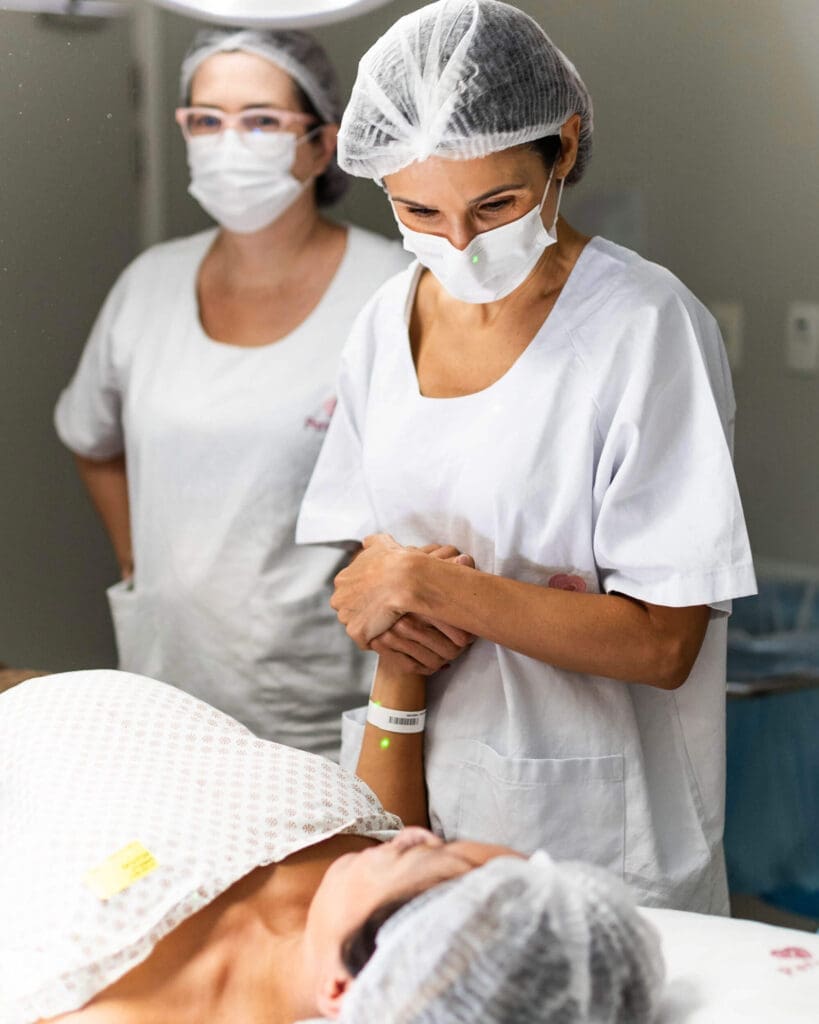
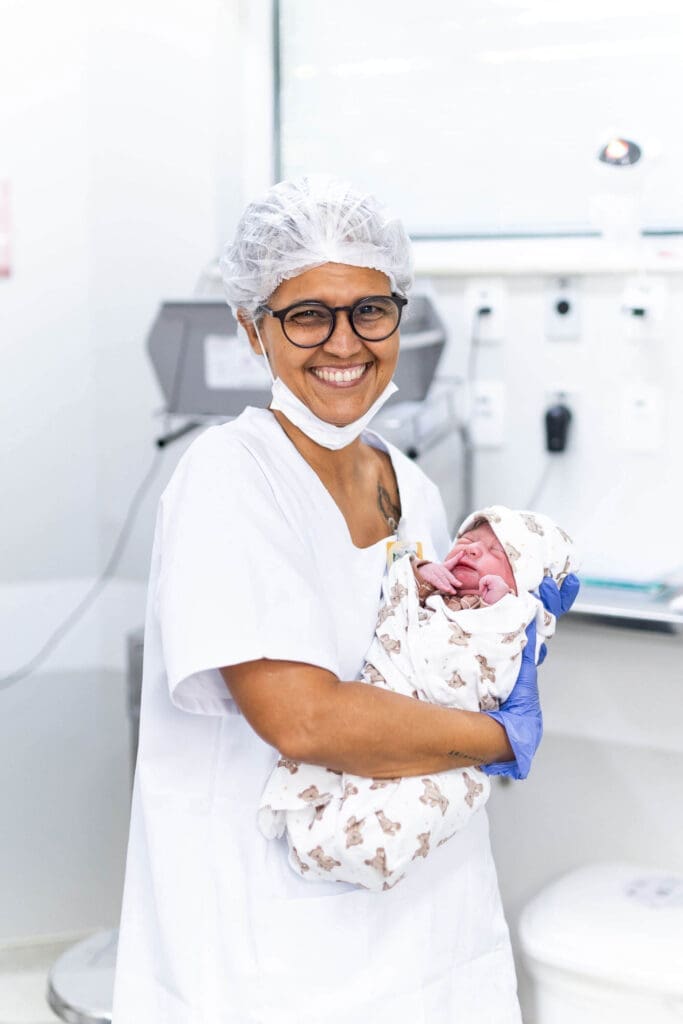

For privacy reasons, I will only be sharing information about my birth team privately.
Please follow me on Instagram and DM me to get the contacts for everyone on my birth team!
Do I need insurance or can I pay out of pocket?
If you already have maternity insurance, that is amazing and it will most likely cover most if not all of your costs in private hospitals in Brazil.
However, in my experience, I started looking at insurance only after already getting pregnant, and most plans, if not all plans, require you to be paying into it for at least a year before getting pregnant, which I had no idea about.
So I just didn’t qualify for any international maternity insurance. You can still pay out of pocket like I did, but you’ll just want to confirm pricing with all of your providers, get quotes from them all, and plan ahead for all of your care delivery and postpartum services.
When I was researching and starting to get quotes, I was like, I can either pay out of pocket for this experience here in Brazil where it’s summertime, next to the beach, or I can be in the US or England in the cold (I was due in February) and I would have to pay out of pocket for the NHS because I would be entering on a tourist visa.
Comparing all of my options, I just wanted to choose what felt right for me, especially because we had the time freedom, location freedom, and financial freedom to be making these decisions.
My Experience Giving Birth
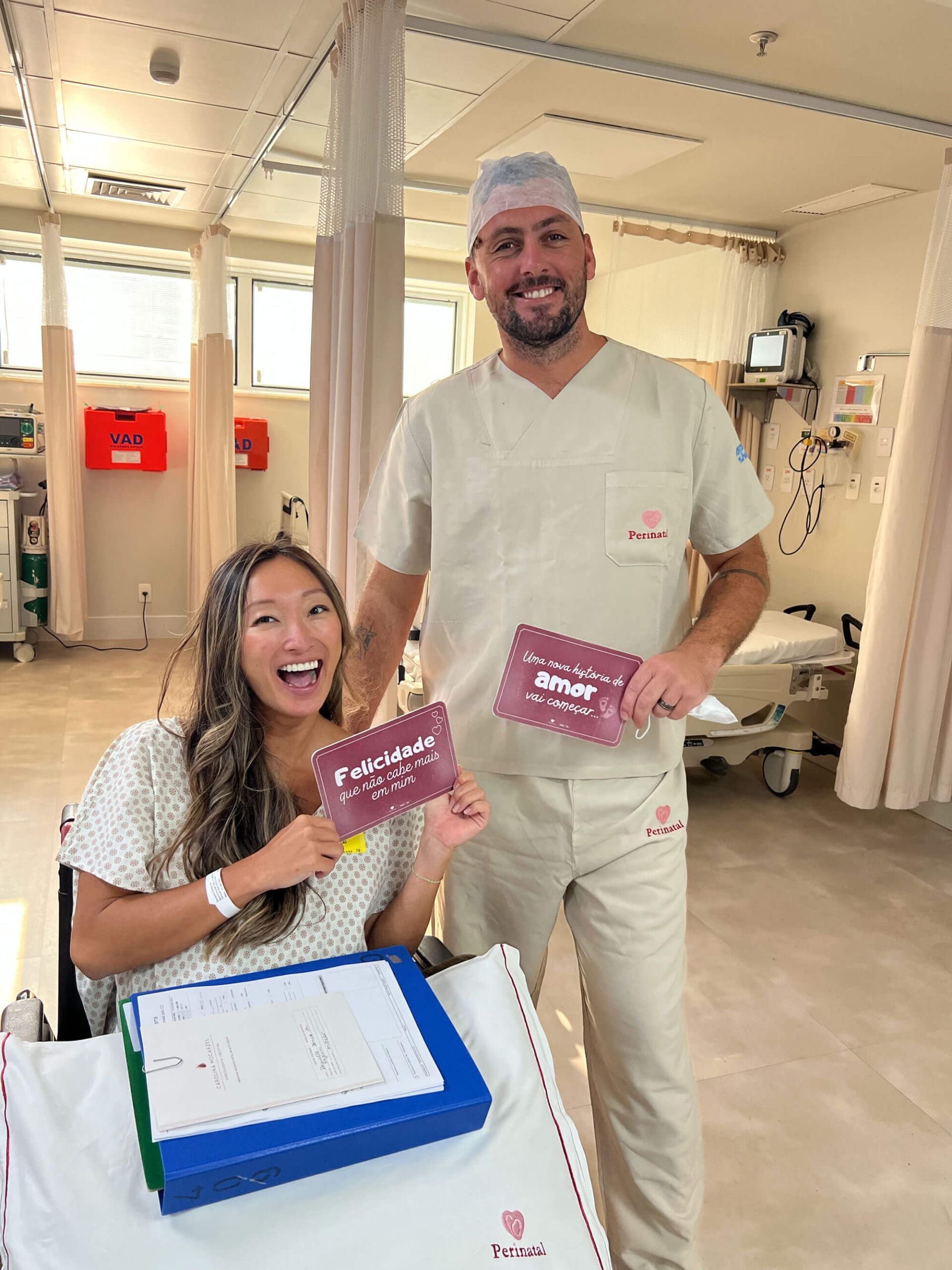

What surprised me the most, I was blown away by just how personalized and respectful the care was, and the whole experience was in Rio.
My doctors all knew me by my name. They encouraged me to call them with any questions. I had access to them 24/7 via WhatsApp. I still text them to this day. I follow them on Instagram. We reply to each other’s stories, and if anything comes up, they respond immediately.
They respected all of my birth preferences. Everyone was so supportive. No one was judgmental, and they truly make you feel like a person and not just a patient.
I honestly cannot imagine any doctor in America who I have this relationship with, just because there is such a process, like it takes you a few weeks just to get your appointment. It’s just not so easily accessible with the whole insurance system in America.
Everything in Brazil was totally patient first. The hospital was clean and modern, and I was just so touched by how much the nurses cared not just for me, but for my baby and my partner.
Our birth photographer documented everything from arriving at the hospital to the live birth (she was in the operating room), and post surgery in the hospital room.
We also got to keep a placenta painting that the physiotherapist made!

Final Thoughts
I hope I answered most of your questions regarding this whole process.
I cannot stress enough that giving birth in Brazil was one of the most empowering and heartwarming chapters of my life and I wouldn’t have traded the experience for anything.
If you are considering an international birth or becoming an international family, know that it is possible and you deserve the best care wherever you choose to bring your little one into this world.
If you found this helpful, please share it with an expecting mama or a fellow traveler, and feel free to DM me with any other questions!
Listen On The Podcast
Pin On Pinterest

Read Next
Sharing My Controversial Pregnancy, Birth, and Travel Plans!
Navigating Marriage, Business, and Full-Time Travel as a Digital Nomad
Pedra do Telegrafo Hike, Rio de Janeiro: All You Need to Know
My Birth Story in Rio de Janeiro
10 Lessons from 10 Weeks of Motherhood
Rio de Janeiro vs Florianopolis: Which Brazilian City is Better?
Top 5 Beaches in Florianopolis, Brasil
Praia do Rosa Brazil Travel Guide
Traveling With A Baby! Digital Nomad Life as a Family
My 3-Month Maternity Leave Recap and Insights
How I Travel for Free Using Credit Card Points
What Time Freedom, Location Freedom, and Financial Freedom Mean To Me











